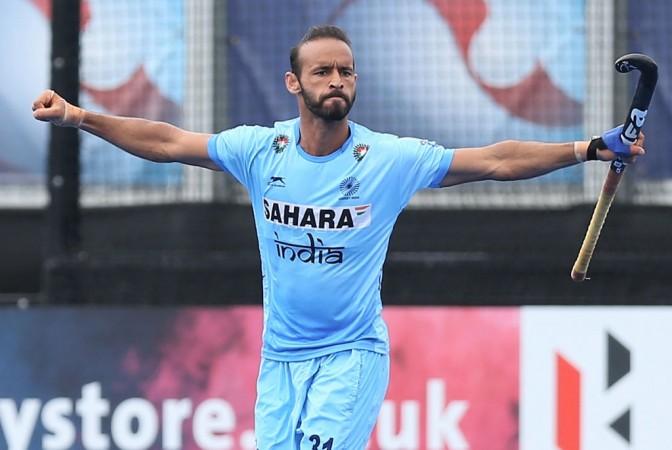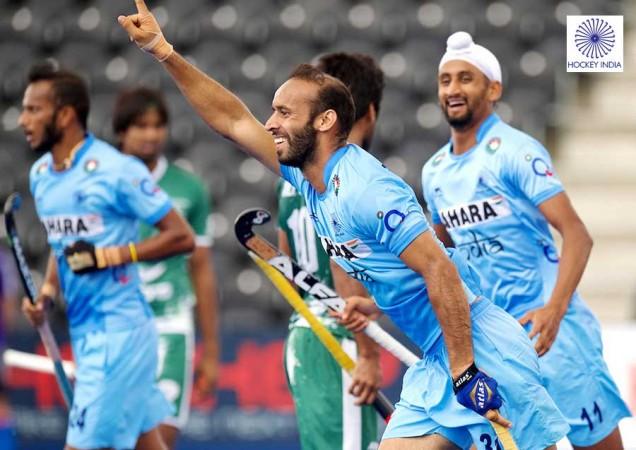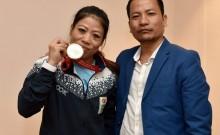
Ramandeep Singh is still a young man. However, at the age of 26, he has already become one of the most important and essential members of the side. In his career playing as a forward for the Indian side, Ramandeep has shown that, for all the decline in Indian hockey, the flair and skills that define the sport in this country is still, very much in place.
In an exclusive interview with Akshay Saraswat of International Business Times, India, Ramandeep talks about his role in the team, the callenges facing him currently and the cuture of the team.
Last year, the Indian team suffered a heart-breaking loss in the quarter-finals of the World Cup and earlier this year, there was a disappointing loss in the Sultan Azlan Shah tournament's final through a penalty shoot-out. How hard is it to get over such disappointments?
Ramandeep: Whenever you lose, you lose as a team and whenever you win, you win as a team. So, for instance, when we lost in the Asian Games final, we looked at the video of the match, recognised our mistakes and tried to correct them for future. Continuing positive behaviour is also very important whenever you suffer a big loss in a tournament.
In the FIH Series Finals some time ago, your individual performance was brilliant but did you feel that your team was slightly vulnerable in defence?
Ramandeep: Whenever you play a tournament where there is a lot of pressure, the team improves with every match. In this tournament also, after our first game, we kept on improving all the way to the final. In the semi-final, we played Japan, who had won the Asian Games last year and have done really well in recent times. But we won that game by a 7-2 margin. It's a big margin and in the final also, we beat South Africa 5-1.

So, I think whenever the team has played, it has shown improvement. I was also returning to the team after a gap of one year. We have also got a new coach. So, a lot of change has taken place in this one year. As a result, it takes a couple of matches for the players to fully get used to the new setting. Once the team settles, then, everything becomes easy. The same thing happened with us. The more settled we became, the better we performed in the latter matches.
You have two other very capable attackers with you in the form of SV Sunil and Mandeep Singh. Sunil is vastly experienced as well. How much does having them with you help your individual performance?
Ramandeep: You see, players like me, SV Sunil, Akashdeep Singh, Mandeep Singh, all of us have been playing together for 5-6 years now. So, that has created quite a good understanding among us. We know, for instance, how fast SV is. When you play together for a long time, the understanding between players keeps increasing. So, I think all the senior strikers, their understanding, aided by the instructions of the coach, the more it increases, the better the team performs.
When you enter the circle of the opponent, what are your instincts – to take a shot at goal or look for a penalty corner?
Ramandeep: You see, if you have a good angle and you can take a shot, then one should go for it. But if you have a narrow angle and it's difficult to score a goal, then, since India has good drag-flickers who have been performing well in recent times, you have the option of creating a penalty corner or, if someone is in a good position to score, you can give a pass to him.
Personally, for you, what is more satisfying – dribbling the ball past defenders and dodging them or whatever looks the safer option?
Ramandeep: Whatever benefits the team is important. When we play these days, the team is first for us. As an individual player, we can't win matches on our own. If you perform well as a team and have good co-ordination, if you keep the team first and pass to the player who is in a good position, you create better understanding. It looks good also and produces good results.

When your team is having a strong lead over the opposition, going into the last quarter, what instructions does the team give to strikers like you – keep attacking or fall back in defence to protect the lead?
Ramandeep: Well, in modern hockey, you have to keep playing attacking hockey. If you lie back even a little bit, the other team starts pushing you, they get chances and you come under pressure. When you are ahead by 1-2 goals and your confidence is high, you should keep playing attacking hockey.
Have you always played as a right winger or in other positions as well?
Ramandeep: No, I play as a striker in all positions, be it centre-forward, left-winger or right-winger.
The system used for penalty-shootouts these days has changed. Players are coming up with different types of tricks for beating the goalkeepers. How much of your time is given to training for this new system of penalty shootouts?
Ramandeep: Earlier, it was easy to score through penalty strokes in the shootouts. Now, with the 8-second rule, it has become difficult to score. The goalkeeper now has a 50% chance of succeeding. So, you have to train and develop the correct mind-set for such situations. You also have to look at your confidence level to decide whether you are ready for the shoot-out or not.
So, how much time out of your daily practice do you dedicate to training for the shootouts?
Ramandeep: So, we have special training for various things like penalty corners, shootouts, etc. Sometimes, we do some extra training on our own as well. So, it depends upon you, how you make yourself mentally strong and how you develop your skills.

But when the pressure is really high in shootouts, for example, if you have to score to keep your team from losing, how do you deal with that situation?
Ramandeep: So, we train the entire year and trust that training to get us through these situations.
One thing that has remained constant over the decades in Indian hockey is the presence of good strikers and forwards from Punjab. Is the culture of hockey in Punjab as strong as it has been in the past?
Ramandeep: Yes. There are lot of good institutions like Surjeet Academy, Amritsar Academy, Mohali Academy, etc. The training provided in these academies and the coaches are really good. When we go there and meet the trainees also, we see that they are undergoing very good training. That's why Punjab produces good strikers and players.
In terms of fitness, the Indian team seems to be leading the way in the world of hockey. How much effort do you have to put in for maintaining this level of fitness?
Ramandeep: Well, for instance, we have been avoiding eating sweets for a long time. We have to take care of everything and our trainer guides us on how to go about things for maintaining fitness. So, before the training session, we have our fitness check, conditioning sessions, gym sessions, etc. The combination of all these maintains the fitness level of the team. We have to work continuously on our fitness in every camp and training session.














